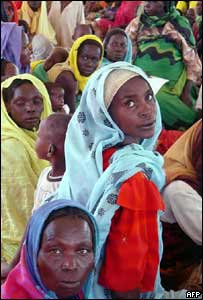
More than a million Sudanese have been forced from their homes
|
At least 45 Sudanese have reportedly been killed by pro-government militias in the troubled western Darfur region.
An official from the rebel Sudan Liberation Movement told AFP news agency that the "Janjaweed" militia had attacked a village south of Nyala town.
Witnesses said the militia fired on villagers and set their homes alight.
The reports of the latest violence come as humanitarian groups warn that the situation in Darfur will worsen if the United Nations fails to act decisively.
Some one million people have fled Darfur, where pro-government militias are accused of "ethnic cleansing".
Black Africans in the region say the Arab "Janjaweed" militias are chasing them from their homes and are working with government forces.
Since the conflict in Darfur began in February 2003, some 130,000 people have fled to neighbouring Chad, while an estimated 900,000 are displaced within Sudan.
'Shorthand for shame'
The Brussels-based International Crisis Group (ICG) has called for immediate action in the region - especially from the UN Security Council - to save hundreds of thousands of people they warn are facing attack, disease and starvation.
It said hundreds of thousands of lives were directly threatened by the Janjaweed militias and by lack of food.
"Urgent international action is required on several fronts
if 'Darfur 2004' is not to join 'Rwanda 1994' as shorthand for international shame," the ICG said in its report.
"What UN officials have already called the worst humanitarian situation in the world today could claim an additional 350,000 in the next nine months, mainly from
starvation and disease."
On 7 May a UN assessment team that had visited the region, briefed the UNSC on the situation on the ground.
Instead of ordering direct action, the UNSC chose to "closely monitor developments on the ground".
The UN's "inaction" in the face of mounting reports of continuing atrocities is believed to have prompted the IGC's call for decisive action from the UN.
Military intervention
In its report the ICG calls for the international community to put pressure on the Sudanese government to allow full humanitarian access to the Darfur region.
Such pressure may already be paying off as visa restrictions on aid agencies workers were eased on Thursday.
The British Aid agency Oxfam has said it is stepping up its operations as result and sending an extra 15 expert staff.
But in the event that this promised access fails to materialise, the ICG has recommended that the UN plans a military intervention on humanitarian grounds.
"There must not be a repeat of much of the last 20 years in southern Sudan, when two million people perished as the aid faucet was turned off and on
at the whim of the Khartoum government," the report said.
"If 'never again' means anything, then it's now or never in Darfur".

